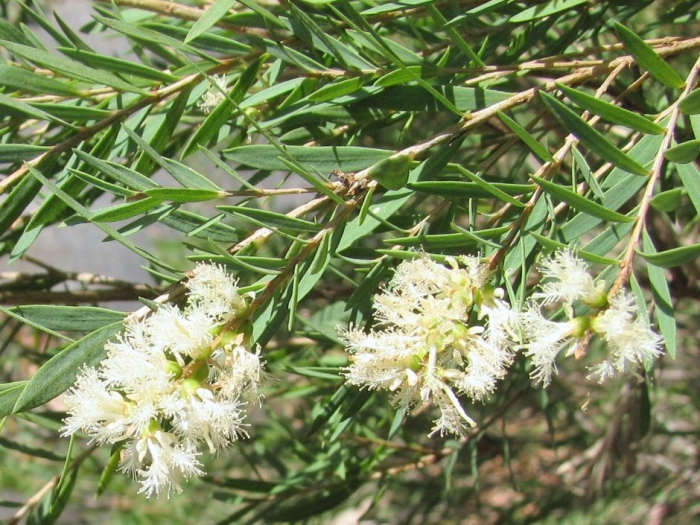Snow-In-Summer
(Melaleuca linariifolia)
Snow-In-Summer (Melaleuca linariifolia)
/
/

Eug
CC BY 3.0
Image By:
Eug
Recorded By:
Copyright:
CC BY 3.0
Copyright Notice:
Photo by: Eug | License Type: CC BY 3.0 | License URL: https://creativecommons.org/licenses/by/3.0 | Uploader: Eug | Publisher: Wikimedia Commons | Title: Melaleuca_linariifolia.jpg | Notes: User created page with UploadWizard |




























Estimated Native Range
Summary
Melaleuca linariifolia, commonly known as Snow-in-summer, Narrow-leaved Paperbark, Flaxleaf Paperbark, and in the language of the Gadigal people as Budjur, is a hardy, evergreen tree or large shrub endemic to coastal swamps and wetlands in eastern Australia. It typically grows to a height of 5-10 meters (16-33 feet) with a spread of 3-5 meters (10-16 feet). The tree’s appearance is characterized by its flaky white to grey bark, narrow leaves, and profuse white to creamy-white flowers that are highly perfumed and arranged in dense spikes at the ends of branches. These flowers bloom in late spring or summer, creating a striking display. After flowering, woody capsules containing seeds follow. The plant is noted for its ability to provide significant ecological benefits, such as supporting native wildlife and insects.
Melaleuca linariifolia is valued for its ornamental beauty, particularly its showy flowers and unique bark. It is used in parks and gardens for aesthetic purposes, as well as for screens, windbreaks, and nature strips. Despite its adaptability to a range of conditions, including dry and boggy soils, and its frost hardiness, gardeners should plant it with care due to its potential to damage wastewater pipes and its high flammability. It is suitable for planting under powerlines and serves as a food or habitat source for native fauna. For optimal growth, it prefers full sun to part shade, medium water availability, and well-drained soils.CC BY-SA 4.0
Melaleuca linariifolia is valued for its ornamental beauty, particularly its showy flowers and unique bark. It is used in parks and gardens for aesthetic purposes, as well as for screens, windbreaks, and nature strips. Despite its adaptability to a range of conditions, including dry and boggy soils, and its frost hardiness, gardeners should plant it with care due to its potential to damage wastewater pipes and its high flammability. It is suitable for planting under powerlines and serves as a food or habitat source for native fauna. For optimal growth, it prefers full sun to part shade, medium water availability, and well-drained soils.CC BY-SA 4.0
Plant Description
- Plant Type: Tree
- Height: 20-30 feet
- Width: 10-20 feet
- Growth Rate: Slow, Moderate
- Flower Color: White, Cream
- Flowering Season: Summer
- Leaf Retention: Evergreen
Growth Requirements
- Sun: Full Sun, Part Shade
- Water: Medium
- Drainage: Medium, Fast
Common Uses
Bee Garden, Bird Garden, Butterfly Garden, Fragrant, Hedges, Hummingbird Garden, Low Maintenance, Salt Tolerant, Showy Flowers, Street Planting
Natural Habitat
Coastal swamps and wetlands in eastern Australia
Other Names
Common Names: Narrow-Leaf Paperbark, Snow-In-Summer, Flax-Leaf Paperbark, Narrow-Leaf Teatree, Cajeput Tree
Scientific Names: , Melaleuca linariifolia, Metrosideros hyssopifolia, Melaleuca hyssopifolia, Melaleuca linariifolia var. typica, Melaleuca stricta, Myrtoleucodendron linariifolium, Ozandra hyssopifolia,
GBIF Accepted Name: Melaleuca linariifolia Sm.